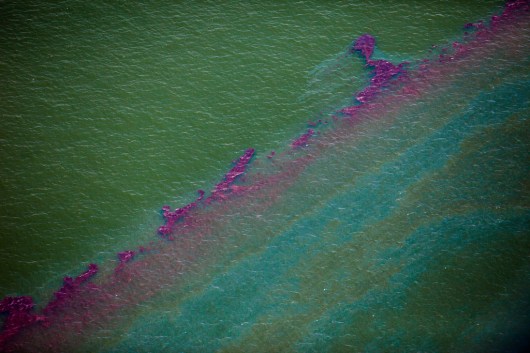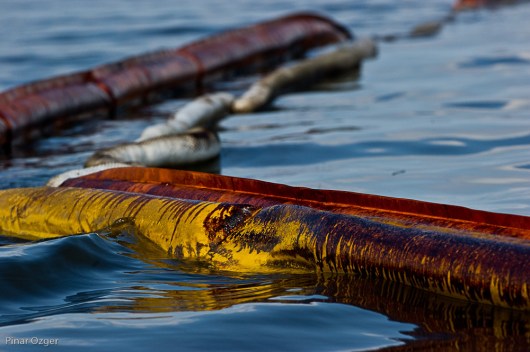
Cesar Harada, deep in thought at TED2014. Photo: Ryan Lash
Two years ago, a chance discussion with a group of Gulf of Mexico fishermen changed the course of Cesar Harada’s life. The TED Senior Fellow had landed his dream job at MIT in Boston, but after hearing first-hand accounts of the conditions in the Gulf following the Deepwater Horizon Oil Spill of 2010, Harada tendered his resignation and moved to New Orleans. His mission: to create a boat better able to drag absorbent material through the spill area for more efficient clean up.
Harada looked to ancient sailing techniques to inspire his design. In the end, he created a vessel — called Protei – that bends and flexes, capturing the wind in both directions. The boat is able to tightly snake through oil-covered areas, with the current, cleaning wide swaths of oil with low energy output.
As Harada developed his shape-shifting prototype, he published the plans online, collaborating with others to make the boat as efficient as possible. Rather than try to profit from his new sailing technology, Hasada aims to keep all the hardware open-source. As he says in his inspiring TEDTalk, “We need to share information … to replace competition with collaboration.”
Because Harada believes so deeply in sharing, below, a look at other oil spill clean up technology with great promise.
A robot that detects spills
Liquid Robotics, a start-up in San Francisco, has created a robot that can sense oil leakage around drilling platforms. As CNN reports, these robots could prevent rig explosions like the one that happened in the Gulf. Even better? The robots are powered only by the sun and the waves. While the bots are pricey — $200K, to be exact – the company is reportedly looking to make them rentable as well as buyable.
Soak-up sponges
Oil in the ocean may not be too different from cooking oil dripped on your kitchen sink. According to Science Daily, researchers at Case Western Reserve University have developed a lightweight sponge called aerogel — made of clay and plastic — that absorbs large amounts of oil. Made on a mass scale, these sponges could tackle spills in the ocean — and allow the sopped-up oil to be squeezed out for use after absorption.
A very groovy disc
At TEDxOilSpill, held in 2010, Wendy Schmidt and the X Prize Foundation announced that they would donate $1.4 million to teams presenting novel solutions to the Gulf of Mexico clean up effort. Team Elastec, an Illinois-based company specializing in oil spill recovery, won the first prize of $1 million by creating a giant grooved disc that skims oil more than three times more quickly than the industry standard. “When we first started, I gotta admit we said, ‘We don’t know if we can do this,’” said team member Charles Storey. Their winning skimmer, however, recovered an astounding 4,670 gallons of oil per minute.
An oil-collecting funnel
So who won second prize? Team Nofi, a maritime technology company from Norway. The group won $300K for their innovative Current Buster system, which captures 2,712 gallons of runaway oil per minute. As X Prize technical director Jeff Skipper, “It’s like a great big Slip ‘n’ Slide with two huge pontoons.”
Magnetic soaps
One of the biggest problems with current oil spill clean up is the use of oil dispersants, which do not easily break down. According to the website Mother Nature Network, scientists at the University of Bristol have created a more environmentally-friendly soap — still in development — that is iron-rich and salty. Thus, when magnetic force is applied, the soap rises to the surface — with the oil still trapped inside.
And check out these TEDTalks about oil spills:
The political chemistry of oil
Lisa Margonelli, Director of the New America Foundation Energy Policy Initiative, says that oil executive firings are pure political theater. The real issue with oil spills is the insane amount of oil we consume.
The oil spill’s toxic trade-off
Marine toxicologist Susan Shaw explains how the clean up strategy of chemically breaking down an oil spill might save beaches, but at a far too great cost to the deep sea.
The oil spill’s unseen culprits and victims
Ecologist Carl Safina explains why the Deepwater Horizon spill will have ripple effects for a greater time, and over a greater distance, than most of us can imagine.
How we wrecked the ocean
Jeremy Jackson, noted marine ecologist, gives some very scary stats about the damage we are doing to our coral reefs and oceans through pollution, overfishing and overheating.


Comments (9)
Pingback: What is Paypal. How can i get a paypal account if my country don;t offer it. Which countries are allowed.? | ENNO
Pingback: 20120709cesar-harada-on-ted3.com | Egoforex financial Portal
Pingback: Robot Swarms « Adam Piotuch
Pingback: 6 veelbelovende manieren om olie op te ruimen - hetkanWel.nl